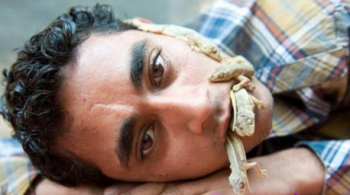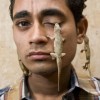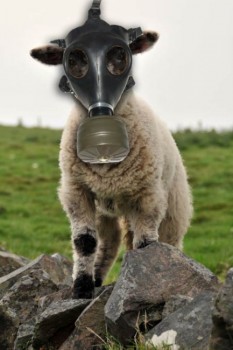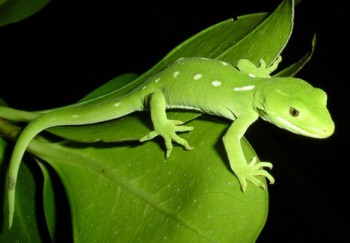 Meet Navratan Harsh, a 21-year-old from Bikaner, Rajasthan state, India, with a bizarre passion for animals, especially Geko lizards.
Meet Navratan Harsh, a 21-year-old from Bikaner, Rajasthan state, India, with a bizarre passion for animals, especially Geko lizards.
Navrathan has been fascinated by lizards, ever since he was a young boy and one fell in his lap, at school. Ever since then, he has spent most of his days feeding and playing with his scaly friends, and even letting them crawl on his face. Around his village, Navratan Harsh is known as Gecko King and Mowgli, because of his close connection with wildlife.


 Unlike other boys his age, who spend most of their time partying and getting drunk, Navratan searches for lizards, plays and trains them, and them lets them go free. He says he feels no pain or fear when lizards bite his face…Creepy stuff!
Unlike other boys his age, who spend most of their time partying and getting drunk, Navratan searches for lizards, plays and trains them, and them lets them go free. He says he feels no pain or fear when lizards bite his face…Creepy stuff!
 The agriculture sector is the nation’s second biggest source of greenhouse gas emissions behind the energy sector, producing about 16 per cent of Australia’s total emissions, The Sunday Mail reports.
The agriculture sector is the nation’s second biggest source of greenhouse gas emissions behind the energy sector, producing about 16 per cent of Australia’s total emissions, The Sunday Mail reports.
Two-thirds of that figure is produced by livestock, and 66 per cent of those emissions are released as methane from the guts of grazing livestock such as sheep and cattle.
Australia’s Sheep Co-operative Research Center is conducting a world-first study into 700 sheep with 20 different genetic lines – each is fed, then shepherded into a booth where scientists measure their burp outputs.
One study leader, Dr Roger Hegarty, said sheep burped large amounts of methane and there was environmental pressure to see whether that could be minimized.
“We’re looking into how to reduce emissions from sheep – all over Australia teams are testing different approaches: changing the microbes in the gut, changing their diet, or changing the genetics of the animal,” he said.
“Our sheep studies are (primarily) aiming to find out if there is genetic control over methane production and, if so, is that a good thing to pursue?”
Dr Hegarty said researchers were wary not to produce other problems in their bid to reduce the animal’s carbon footprint.
“Methane is the exhaust from livestock, and – just as you can’t put your hand over the exhaust pipe of a car and expect it to keep running – we’re treading carefully to reduce emissions without causing other problems,” he said.
 German reptile collector Hans Kurt Kubus, 58, must pay 5,000 New Zealand dollars (around £2,180) in fines for plundering New Zealand’s wild gecko and skink populations, and will be deported back to Germany as soon as he is released from prison.
German reptile collector Hans Kurt Kubus, 58, must pay 5,000 New Zealand dollars (around £2,180) in fines for plundering New Zealand’s wild gecko and skink populations, and will be deported back to Germany as soon as he is released from prison.
Kubus was caught by wildlife officials at Christchurch International Airport on South Island in December, about to board an overseas flight with 44 geckos and skinks in a hand-sewn package concealed in his underwear.
He admitted trading in exploited species without a permit and hunting absolutely protected wildlife without authority, pleading guilty to two charges under the Wildlife Act and five under the Trade in Endangered Species Act.
Department of Conservation prosecutor Mike Bodie told Christchurch District Court that it was ‘the most serious case of its kind detected in New Zealand for a decade or more.’
The geckos may have been worth 2,000 euros ($2,800) each on the European market, he noted. Customs records showed that Kubus had also been to New Zealand in 2001, 2004, 2008, and 2009. In 2008, he visited with a Swiss reptile dealer.
Judge Colin Doherty said there was the potential that Kubus end up with far more animals than he could have housed in his own collection, and the rest would have been sold.
‘I don’t think you necessarily came here to steal to sell, but I am sure the fact that you might have had excess was figured into your thinking,’ said the judge, describing the offending as ‘pretty close to the worst case.’
Have you ever seen a singing donkey?
Well, you can’t miss this funny duo. A men playing a trumpet and a donkey singing.




